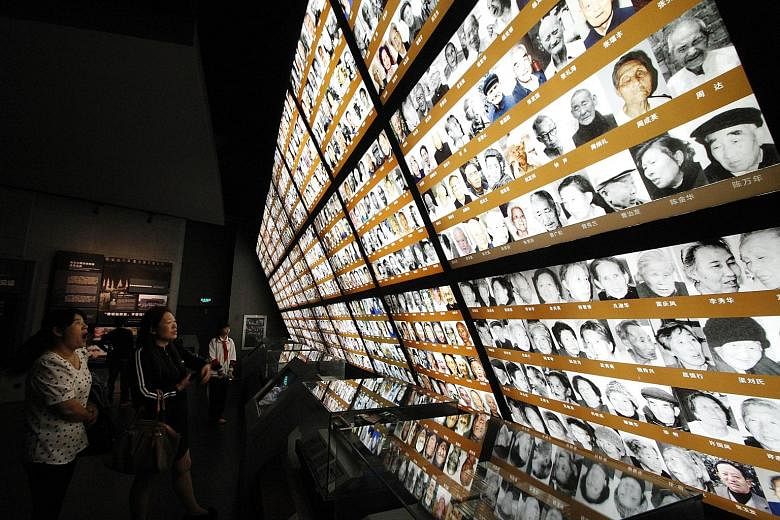Japan should respect Unesco's decision
Zhu Yuan
China Daily
Among 47 new inscriptions, the United Nations Educational, Scientific and Cultural Organisation (Unesco) added documents of the Nanjing Massacre to its Memory of the World Register onOct 9.
International recognition of the documentary heritage testifying to the atrocities committed in the city is an important part of international efforts to preserve the collective memory of mankind and promote peace and justice.
Given the repeated denials and whitewashing of their country's past by Japanese nationalists, Unesco's inclusion of the materials as part of the world's memory is an authoritative international refusal to condone the lies of Japanese far-rightists.
As a country that has yet to sincerely own up to its history of aggression in World War II, Japan tried to block the Unesco move. After the Unesco decision was made, Japan's Foreign Ministry called it "extremely regrettable" and questioned the world body's neutrality and fairness.

It even called for the process to be reformed.
Such comments are based on neither fact nor reason.The event, often referred to as the "Rape of Nanking", was reported worldwide and witnessed by journalists from Western media, including The New York Times, the Associated Press and the Chicago Daily News. No respected historian or mainstream academic in the world doubts that the massacre took place.
As for the Unesco decision, it was made following a two-year process as part of the 2014-2015 nomination cycle during which 88 submissions from 61 countries were examined. The Japanese accusation is a desperate attempt to discredit its decision.
Unesco shouldn't have added Nanjing incident to memory list
Editorial
The Yomiuri Shimbun
Could the latest Unesco registration be misunderstood as a stamp of approval given by an international organisation to mainland China's one-sided claim concerning historical perception?
This is a serious situation.
"Documents of Nanjing Massacre", which China recommended to Unesco, was added to its Memory of the World Register. After the selection by Unesco's International Advisory Committee, the UN organisation's director-general, Ms Irina Bokova, made the final decision.
Another item recommended by China - materials related to so-called comfort women - was not registered in the list.
The Memory of the World Register was originally meant to preserve or utilise historically important documents and other materials. We cannot accept China's stance of using a system for protecting cultural assets for political purposes in a campaign against Japan.
"Documents of Nanjing Massacre" includes written rulings on Japanese war criminals at the Nanjing Incident tribunal after the end of World War II. The written rulings put the number of victims in the incident at "more than 300,000". However, in Japan, the dominant view is that, based on demographic statistics for Nanjing at that time and other factors, a death toll of "more than 300,000" is far removed from reality.
Concerning the registration on the list, Japan's Foreign Ministry questioned the "integrity and authenticity" of the documents and said their registration was problematic for "an international body that should be neutral and fair".
This time, other items recommended by Japan, such as "Return to Maizuru Port" records, which include diaries and letters of Japanese detainees in Siberia, were added to the list.
More time needed to amend Seoul's history textbooks
Editorial
The Korea Herald
In announcing the reintroduction of state-written history textbooks starting in 2017 - state-authored history books were imposed in 1974 during the time of president Park Chung Hee, father of President Park Geun Hye, and state-reviewed textbooks were revived in 2011 - the Education Ministry said the move was necessary as the current textbooks contain numerous factual errors and offer mostly leftist perspectives of history.
As the Education Ministry is responsible for reviewing history textbooks, the ministry should take responsibility for sanctioning the textbooks with inaccuracies and ideologically biased views. In fact, if the ministry had done a proper job of reviewing history textbooks in the first place, the whole issue of state history textbooks may never have been raised.
How is the Education Ministry to be trusted with publishing "correct" and "balanced" history textbooks when it is not competent enough to conduct thorough reviews of ones written independently?
Even if we were to assume that the Education Ministry will somehow suddenly become competent, it faces many hurdles.
First, there is the question of who will write these textbooks. The government said it would recruit a pool of 20 to 40 scholars from various fields, including history, sociology and economics. However, with much of academia opposing the return to state-written history textbooks, it will prove to be difficult to get highly qualified experts on board.
Second, the Education Ministry will be working on a very tight schedule and will be forced to rush to get the textbooks ready by March 2017. As with any group effort, the project will require discussions, debates and adjustments before the actual compilation can even begin.
Needless to say, a year is hardly sufficient to produce "accurate" and "balanced" history textbooks.
•The View From Asia is a weekly compilation of articles from The Straits Times' media partner Asia News Network, a grouping of 22 newspapers. For more, see www.asianewsnet.net

